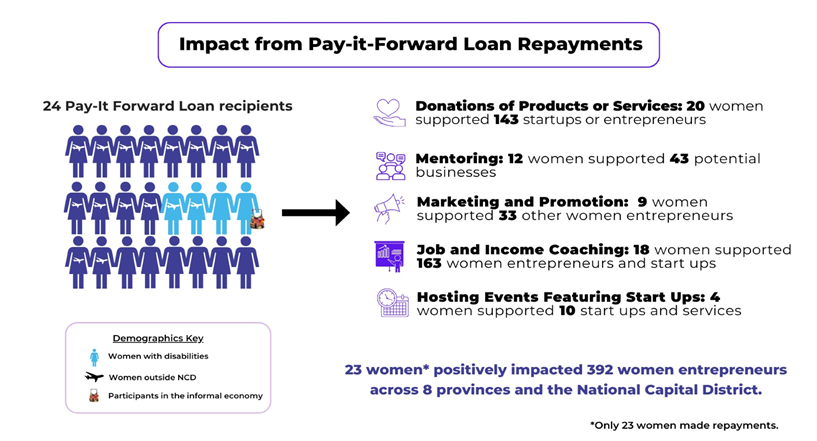Since 2013, the Center for International Private Enterprise (CIPE) has utilized business solutions to build creative, demand-driven programs in Papua New Guinea (PNG). This dedication to pioneering programs has produced a high return on investment for marginalized groups across PNG. The text below outlines three trailblazing programs CIPE has implemented over the past decade.
On November 15, 2016, CIPE opened its first Women’s Business Resource Centre (WBRC) in Port Moresby and began offering trainings for women. Since its establishment, the WBRC has created opportunities and empowered women of all backgrounds through entrepreneurship training and business enhancement services. The WBRC provides a safe space, information, and resources to address women’s business needs holistically. Within the first six weeks, 100 women visited the Centre, demonstrating the need and immediate impact of trainings, and by the end of that year, that number grew to 368. One-third of these visitors returned, leading to demand for diversified training.
To expand offerings, CIPE and the WBRC offered a seven-month Guria Business Accelerator program to assist new female entrepreneurs and established businesswomen in refining and growing their business models. This multi-faceted program, the first of its kind in PNG, generated high involvement from the local business community; all participants shared that they would recommend the program to others.
To date, the WBRC has provided resources and a safe space for over 6,300 women through renovations to the physical space, sign language translation at workshops, and resources translated to the local languages of Tok Pisin and Motu.
In other parts of PNG, CIPE has maintained its commitment to strengthening institutions and enhancing resources for marginalized communities interested in engaging in entrepreneurship. Working with local university partners, CIPE launched entrepreneurial curricula and entrepreneurship concentration programs for PNG students. In establishing these programs, CIPE focused on fostering the growth of intentional business-minded changemakers among youth and equipping business school faculty with the appropriate curriculum and pedagogy to ignite students’ entrepreneurial spirit. When Pacific Adventist University (PAU) first launched its entrepreneurship course, 23 students enrolled; PAU now offers its students the opportunity to pursue majors in both accounting and entrepreneurship.
Elsewhere, IBSUniversity (IBSU) rolled out its Student Entrepreneurship Program in 2020, encouraging students to create opportunities rather than look for them. The collaboration between IBSU and CIPE has produced more than five student-led startups and engaged 100 students in building their entrepreneurial journey. With CIPE’s assistance, PAU, Divine Word University, and IBSU have dedicated resources to offering entrepreneurship courses and programs to match increasing demand. These programs progressed even further through CIPE’s small grants that provided faculty with financial resources to create an entrepreneurial ecosystem on campus, resulting in over 100 students gaining expertise in promoting gender equity, learning about Small and Medium Enterprise (SME) corporate governance and operations, and pitching business ideas to external stakeholders. Through CIPE’s programming, the next generation of PNG youth can choose to become entrepreneurs and change-makers.
CIPE has also explored creative solutions to a challenge facing many entrepreneurs: access to finance. The COVID-19 pandemic devastated businesses across PNG, especially women-owned and operated businesses. To ensure business resilience and assist women in overcoming the impacts of COVID-19, which compounded challenges in accessing finance, CIPE launched the first-ever Pay-It-Forward (PIF) Loan program in PNG. The “loan” received is representative of a grant that recipients pay forward to the community through acts of service rather than back to CIPE monetarily.
23 of the 24 diverse recipients, including four women with disabilities and 16 entrepreneurs from outside the National Capital District (NCD), positively impacted 392 women’s SMEs across eight provinces and several industries. One recipient paid it forward by facilitating a free business marketing training held at the WBRC. Furthermore, 143 startups and established women entrepreneurs benefited via donations of products or services from PIF recipients. This innovative approach to providing accessible capital for female entrepreneurs during the pandemic resulted in various opportunities for businesswomen with positive ripple effects in their communities.
These three programs demonstrate CIPE’s commitment to demand-driven, creative programmatic solutions. CIPE continues to trial and adopt unique, locally-owned solutions to complex issues at the intersection of democratic and economic development in PNG and across the Pacific.

